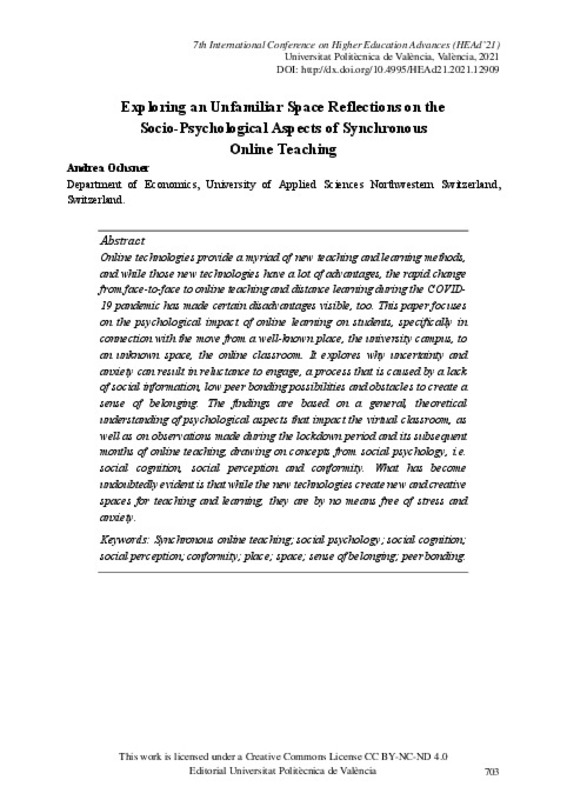JavaScript is disabled for your browser. Some features of this site may not work without it.
Buscar en RiuNet
Listar
Mi cuenta
Estadísticas
Ayuda RiuNet
Admin. UPV
Exploring an Unfamiliar Space Reflections on the Socio-Psychological Aspects of Synchronous Online Teaching
Mostrar el registro sencillo del ítem
Ficheros en el ítem
| dc.contributor.author | Ochsner, Andrea
|
es_ES |
| dc.date.accessioned | 2021-09-13T09:57:53Z | |
| dc.date.available | 2021-09-13T09:57:53Z | |
| dc.date.issued | 2021-07-26 | |
| dc.identifier.isbn | 9788490489758 | |
| dc.identifier.issn | 2603-5871 | |
| dc.identifier.uri | http://hdl.handle.net/10251/172213 | |
| dc.description.abstract | [EN] Online technologies provide a myriad of new teaching and learning methods, and while those new technologies have a lot of advantages, the rapid change from face-to-face to online teaching and distance learning during the COVID-19 pandemic has made certain disadvantages visible, too. This paper focuses on the psychological impact of online learning on students, specifically in connection with the move from a well-known place, the university campus, to an unknown space, the online classroom. It explores why uncertainty and anxiety can result in reluctance to engage, a process that is caused by a lack of social information, low peer bonding possibilities and obstacles to create a sense of belonging. The findings are based on a general, theoretical understanding of psychological aspects that impact the virtual classroom, as well as on observations made during the lockdown period and its subsequent months of online teaching, drawing on concepts from social psychology, i.e. social cognition, social perception and conformity. What has become undoubtedly evident is that while the new technologies create new and creative spaces for teaching and learning, they are by no means free of stress and anxiety. | es_ES |
| dc.format.extent | 8 | es_ES |
| dc.language | Inglés | es_ES |
| dc.publisher | Editorial Universitat Politècnica de València | es_ES |
| dc.relation.ispartof | 7th International Conference on Higher Education Advances (HEAd'21) | |
| dc.rights | Reconocimiento - No comercial - Sin obra derivada (by-nc-nd) | es_ES |
| dc.subject | Higher Education | es_ES |
| dc.subject | Learning | es_ES |
| dc.subject | Educational systems | es_ES |
| dc.subject | Teaching | es_ES |
| dc.subject | Synchronous online teaching | es_ES |
| dc.subject | Social psychology | es_ES |
| dc.subject | Social cognition | es_ES |
| dc.subject | Social perception | es_ES |
| dc.subject | Conformity | es_ES |
| dc.subject | Place | es_ES |
| dc.subject | Space | es_ES |
| dc.subject | Sense of belonging | es_ES |
| dc.subject | Peer bonding | es_ES |
| dc.title | Exploring an Unfamiliar Space Reflections on the Socio-Psychological Aspects of Synchronous Online Teaching | es_ES |
| dc.type | Capítulo de libro | es_ES |
| dc.type | Comunicación en congreso | es_ES |
| dc.identifier.doi | 10.4995/HEAd21.2021.12909 | |
| dc.rights.accessRights | Abierto | es_ES |
| dc.description.bibliographicCitation | Ochsner, A. (2021). Exploring an Unfamiliar Space Reflections on the Socio-Psychological Aspects of Synchronous Online Teaching. En 7th International Conference on Higher Education Advances (HEAd'21). Editorial Universitat Politècnica de València. 703-710. https://doi.org/10.4995/HEAd21.2021.12909 | es_ES |
| dc.description.accrualMethod | OCS | es_ES |
| dc.relation.conferencename | Seventh International Conference on Higher Education Advances | es_ES |
| dc.relation.conferencedate | Junio 22-23, 2021 | es_ES |
| dc.relation.conferenceplace | València, Spain | es_ES |
| dc.relation.publisherversion | http://ocs.editorial.upv.es/index.php/HEAD/HEAd21/paper/view/12909 | es_ES |
| dc.description.upvformatpinicio | 703 | es_ES |
| dc.description.upvformatpfin | 710 | es_ES |
| dc.type.version | info:eu-repo/semantics/publishedVersion | es_ES |
| dc.relation.pasarela | OCS\12909 | es_ES |








